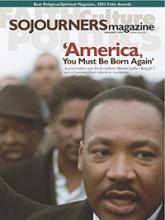Sojourners: What about Martin Luther King has America tried to forget?
Stewart Burns: Many like to honor King only as he stood at the Lincoln Memorial in August 1963, frozen in time, talking about his dream of justice. But King lived for five more years, during which he deepened his understanding of American society, especially what was needed in terms of solutions.
King had to come to grips with urban rebellions in cities across the United States that resulted from desperate poverty and dashed expectations. People in the ghettos were saying, Well, if we're supposed to have freedom now, where is it? We don't have jobs, we're massively unemployed, rats are attacking our babies. King, who had grown up middle class, really didn't understand poverty until the Watts revolt of 1965, when he went and talked to people there. He then took leadership in focusing the civil rights movement on economic justice and on a broad range of human rights. And he came to oppose the Vietnam War very strongly and bravely.
All of this had terrific repercussions on his credibility as a civil rights leader. He had been a genius at what I call radical moderation, but it got to the point where his radicalism won out and he could no longer be a moderate leader. He became a nonviolent revolutionary in the sense of deep adherence to the American creed of freedom, equality, and democracy and dedication to making it real for all.
Sojourners: Why do we need another book on King?
Burns: This nation is in the kind of desperate condition, the soul sickness, that King prophesied about in the late 1960s. When he prophesied that America would be doomed unless we solved these interwoven problems of racism, exploitation, and militarism, it was as if he was really talking about the 21st century.
Read the Full Article

